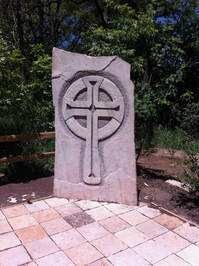 Different things have shaped and informed our spiritual journeys as we walk through life. It’s unlikely that you are in exactly the same spiritual place that you were ten or twenty (or sixty…) years ago. Are there things that have brought freshness into your spiritual life along the way? A deep influence on my journey has been Celtic Christian spirituality. Back in 2007, I was given a Lilly Clergy Renewal grant that helped Plymouth support my sabbatical and also helped bring parts of my experience back to Plymouth. The Lilly grant helped fund the first visits of John Philip Newell and John Bell, Scottish ministers involved with the Iona Community, which provided the initial impetus for the Visiting Scholar program. There are other enduring reminders of Celtic spirituality at Plymouth that include our Living Celtic Christianity group that has been meeting for 16 years, the lovely Celtic cross in our memorial garden that mirrors a slab cross in Glendalough, Ireland. And I know that the influence of Celtic spirituality stays with those who traveled on pilgrimages with Jane Anne and me to Ireland and Scotland and with others as well. What drew me to Celtic spirituality was its authenticity and breadth. Concern for the created world and for humanity is an essential element of the tradition that carries over from the indigenous traditions of the early Celtic world. The inherent goodness of creation is seen through prayers that reflect everyday experience. You may hear that in the benediction I often use: “Deep peace of the running wave to you…” Here is a prayer I use each morning: Christ as a light, illumine and guide me. Christ as a shield overshadow me. Christ over me, Christ under me, Christ beside me on my left and on my right. This day, be within and without me. Be in the heart of each to whom I speak And in the heart of each who speaks unto me Christ as a light, Christ as a shield, Christ beside me on my left and on my right. The inclusion of women in leadership, while not universal, is solidly within the tradition. St. Brigid of Kildare led a monastery that included both women and men. And her legacy continues in Kildare at Solas Bhride, a community of eco-feminist nuns we visited on our pilgrimage. There is obviously a lot more of the tradition to explore! Happily, St. Patrick’s Day falls on a Sunday this year, and we will be celebrating on March 17 with worship in the Celtic style. I hope you’ll join us at Plymouth for worship. Blessings to you! P.S. Don’t forget that Daylight Savings Time begins Saturday night: Spring Forward!
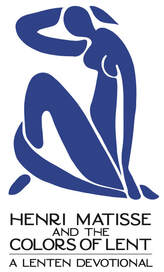 As promised, we’ve lined up some great offerings to help enrich your spiritual journey during Lent, which begins on Ash Wednesday…in just a week! We begin on February 14 with a simple soup supper at 6:15 and a service at 7:00 that includes the imposition of ashes, a sign of penitence. I invite you to join us in several ways during this season: PLYMOUTH READS the Gospel According to Mark This is a perfect opportunity to dust off your Bible and encounter the earliest of the four gospels. It’s also perfect for you if you consider yourself a biblical newbie! You’ll receive a bookmark in your bulletin this Sunday with the reading schedule. Each week, Marta and I will craft a Wednesday email for you with some focus questions on the week’s reading, a visual image, and some suggestions for spiritual practice. We also invite you to join Plymouth’s Facebook group, where we will have online discussion: http://facebook.com/groups/plymouthconnection If you’d like an online Bible, here are two recommended translations:
LENTEN DEVOTIONAL: Henri Matisse and the Colors of Lent This wonderful resource from SALT Project invites you into the experience of visual theology through the lens of Henri Matisse. We’ll be sending you both the adult and family-friendly versions of this devotional booklet by email soon. (We’ll also have some printed copies at the church.) Sue Rutherford and the Forum team will be using this devotional as the basis for forums during Lent, and there will be an intergenerational component to this as well. I hope to see you on Ash Wednesday, as we begin our Lenten journey together! Deep peace, It’s January 2, 2024.
Are you one of those people who make New Year resolutions, or do you avoid doing so because they endure for about a week, leaving you feeling guilty, frustrated, and ashamed? I’m in the second category. It just seems like there is always something that gets in the way at this time of year. Perhaps it is fatigue from the Christmas rush or maybe it’s that there seems nothing especially “special” about the coming of a new year that necessitates making changes. (Do I sound like a New Year Scrooge? Humbug!) If you’ve launched a resolution this week, please don’t let me deter you! Though perhaps a few intentions (not resolutions!) are worth considering. I’m not necessarily good at these, but here are some ideas I’m toying with:
For me, a key time for personal transformation is the season of Lent, which is coming up in about seven weeks, on February 18. (It’s definitely early this year!) Lent is a fixed period that invites us into a time of spiritual reflection. Unlike New Year’s Day, it gives us a five-week span to reflect on ways we need to follow Jesus more closely. It isn’t a day, but rather a whole season. And it provides an annual reminder to ask ourselves what is of deepest importance to us and how we want to bend and shape our lives to a more Christlike form. Jesus has an amazing 40-day wilderness quest to help him clarify his mission and ministry, and during Lent we, too, can use intention to do the same. We have some interesting opportunities for spiritual growth that we’ll be sharing with you as Lent approaches. In the meantime, hang in with your resolutions if you’ve made them. And if you haven’t, don’t worry; you’ll have your chance for change in seven weeks’ time. As we transition from Christmastide into Epiphany may the light of Christ shine within you and all around you, and may you catch a glimpse of the light emanating from others as well. Blessings! Advent is a glorious time of year when we anticipate the birth of Christ within us all by celebrating Hope, Peace, Joy, and Love. And ironically, it has become a time within our congregation when we seem to get stuck in a December rut each year, trying to create a budget and realizing that we still have a sizable number of members who haven’t pledged. A number of folks in our congregation sense fear, anxiety, and doubt about our finances, and their angst can become contagious.
We need a new advent, a new approach, a new calling, at Plymouth that will help us to appreciate the abundance God has entrusted to us. We need a new pattern for sharing God’s wealth that doesn’t give way to scarcity thinking and scrambling to gather late pledges and cobble a budget together. Advent is a season of spiritual transformation. Two beloved stories of the season involve profound changes of heart that turn into action. After visits from three Christmas ghosts, Ebenezer Scrooge has a miraculous change. Scrooge is reborn as a kind, generous man. “His own heart laughed; and that was quite enough for him.” In a more recent story of December transformation, Dr. Suess writes, “And what happened, then? Well, in Whoville they say – that the Grinch’s small heart grew three sizes that day.” Both Scrooge and the Grinch become happier in their transformed lives, and everyone around them is warmed by their newfound joy. That can happen for us, too! Transformation is at the heart of the Christian journey. This is metanoia, a Greek word that Marcus Borg says means to “go beyond your own mind and your own heart.” There is so much to celebrate about Plymouth. So many lives are touched every day by the mission and ministries of your church. Your giving means that pastoral visits happen, little kids have an amazing education program, teen programs are growing, worship on Sunday inspires not only those in the sanctuary, but those in our “virtual balcony” as well. It also means that you support UCC seminaries, homelessness prevention, lobbying for LGBTQ rights in Washington. Our church community of faith needs our hands and hearts, and that means giving our time and our gifts. May each of us sense our hearts grow in this season, and may we as a congregation continue to be a blessing not only to ourselves, but to neighbors near and far. Advent blessings! 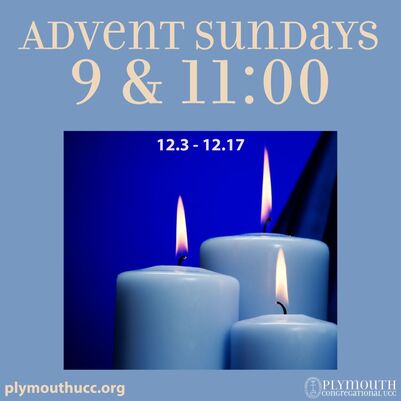 Dear Plymouth Family, Here we are on the day after Thanksgiving... probably already bombarded by advertising for "Black Friday." Of course, there is more to the season than consumer excess. On December 3, we we begin the season of Advent, a time when we watch and wait and wonder. In many ways, Advent is the curative tonic we need during the holiday mayhem that our culture encourages. Even as some encourage us to "put the Christ back in Christmas," the cool thing is that faith hasn't been extracted from this season that leads us into celebrating the nativity of Christ. We have some offerings for you in this season to help deepen your journey: everything from craft night to short reflective films to worship to hanging the greens to Facebook Advent photos to Longest Night. I hope that you will join us as we celebrate this quieter time of spiritual deepening. It's also a great time to invite friends and family to join you at Plymouth on a Sunday or at another event. With so much turmoil, greed, war, violence, and incivility in the world, it’s good to have a place to recharge your spiritual batteries Rather than a written devotional booklet, this year we are offering you three short films from The Work of the People. You might watch one for each of the three Sundays of Advent (the fourth Sunday is Dec. 24 this year). Watch them with friends or family or your fellowship group at Plymouth. Just click on the video images on the Advent page, and you'll go to the Work of the People website. We've made special arrangements to view these without the need for an individual subscription from 12/1/23 -1/2/24. P.S. See all the events at plymouthucc.org/advent
This Sunday at Plymouth we will do something we’ve only done three times in the past 20 years: install a settled associate minister. An installation is a big deal, when a minister, a congregation, and the wider UCC come together to make covenant promises to one another, ritually marking the creation of a new relationship. And we rely on God as a full partner in that covenant.
You’ve probably entered other covenants, perhaps a marriage vow, sponsoring a child at baptism, or when you join a church. A covenant forms a new whole…it is far deeper than a contract. And even though the congregation voted to call my colleague, the Rev. Dr. Marta Fioriti, as our associate minister, her installation on Sunday at 11:00 seals the covenant. It’s as if we’ve been living together for eight months, and we’re finally saying, “I do.” Covenants are especially important in our UCC tradition, in fact they are the glue to joins us together as a people of faith. Episcopalians are joined by their liturgy. Methodists have the Book of Discipline. Presbyterians have the Book of Order. Lutherans have Luther’s Small Catechism. In the UCC, we have none of these; instead, we are guided and bound together by covenant. The Salem Church Covenant of 1629 is how that congregation came together in relationship. “We Covenant with the Lord and one with another; and doe bind our selves in the presence of God, to walk together in all his waies, according as he is pleased to reveale himselfe unto us in his Blessed word of truth.” That simple statement of relationship, that covenant, is critical in the development of who we in the Congregational and the United Church of Christ traditions understand ourselves to be as a gathered church. I encourage you to join us on Sunday at 11:00 (one service only) when our congregation will join in covenant with Marta, the UCC, and with God. Worship will be a celebration, and whether you are with us in person or join us online in our “virtual balcony,” your presence will grace us all. May this and all our covenant promises be blessed! I’ve just returned from visiting two of our elders, one at PVH and another at a rehab facility. It feels wonderful to bring love and light from our congregation into the rooms of people struggling with illness and injury. God’s love is often transmitted by people helping to reflect a little glimmer of divine light into places that some find shadowy. Many of those people, lay and ordained, gather at Plymouth.
There has been a lot in the news lately about the rapid post-pandemic decline of the church and synagogue and the ever-increasing number of “nones,” who have no particular faith, but many of whom believe in God, a higher power, or a force in the universe greater than any of us. But they are scared of church in part because of the way American mainstream media often portrays us is that we are pedophiles, homophobes, hypocrites, anti-intellectual, and very judgmental. (Clearly NOT what we see at Plymouth.) Ironically, we also read a lot about the epidemic proportions of loneliness, especially among elders. Has anyone ever suggested joining a church? One that welcomes and honors the beliefs and perspectives of its members? I see Plymouth volunteers provide a warm, home-cooked meal with a program each month for our seniors. It’s awesome. I also read a lot that people today hunger for community. Churches like ours are about the only place to find intergenerational community in our country today. Community is not unlike a marriage: they both take work. None of us should expect to have ready-made community served to us on a silver platter with no effort. Community takes work and commitment. So, who needs church? Lots of people. Folks who want to find ways to connect with the Holy, who sense a call to put faith into action. People who don’t want to feel isolated. Young adults who want to have fill-in grandparents that their children adore. People who have found that consumerism and self-centeredness are morally vacant. And folks who have discovered that being part of a church community is really rewarding (and sometimes really fun)! Church is not a commodity. It is not bought, traded, or sold. It is possible to come to Plymouth and slip out the door without anyone noticing. It is possible be a member of Plymouth for years without serving on a board or council. It is possible to let the offering plate pass you by and decide not to pledge. Here’s the rub: You are not going to have a fulfilling experience if that is the approach you take. That isn’t how communities are built and thrive. Each of us must shine! We are all in this together. It isn’t my church or Marta’s. It isn’t the UCC’s church. It’s God’s church entrusted to us to love and nurture. We are stewards of a fantastic church, and we should not take it for granted. How are you shining the light of God’s love? If we all share a little glimmer, we can vanquish some of the shadows that fall over the world. I hope you will join me this Sunday — Consecration Sunday — at Plymouth as we dedicate our pledge commitments for 2024 and ask God to bless them and our congregation. You can pledge online anytime at plymouthucc.org/pledge or you can bring your pledge card this Sunday. The Stewardship Board is providing breakfast at 10:00, so if you typically attend the 11:00 service, I encourage you to come an hour early and enjoy great food and fellowship. And if you have pledged (or even if you plan to pledge at 11:00), you will be entered in our raffle, and the winning tickets will be drawn at 10:45. (Prizes include a week in Steamboat Springs, a beer tasting for you and five friends, $100 to spend at Simmer, a great nearby restaurant, tickets to see Jesus Christ Superstar.) See you there! In the spirit of God’s abundance, 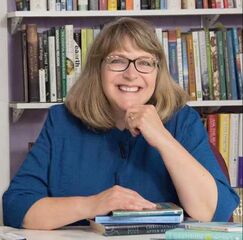 One of the amazing opportunities I’ve appreciated in our congregation is getting to meet and hear some of the great voices of progressive Christianity, right here at Plymouth. Marcus Borg, John Dominic Crossan, John Bell, John Philip Newell, and others have been Visiting Scholars here. You are about to have the opportunity to hear someone whom author Anne Lamott describes this way: “Diana Butler Bass is one of only a few modern Christian writers who can absolutely blow me away with both spiritual insight and beautiful writing. She is a brilliant scholar and a wonderful storytelling, charming and devout, erudite and deeply human.” (I would also add that she has a great sense of humor.) Diana and I met at Ring Lake Ranch many years ago when we were both attending a session with Marcus Borg and Dom Crossan, and we’ve kept up over the years. She often works with Brian McLaren, and the two of them will be back at Ring Lake Ranch next summer. She also preached a sermon at the Wild Goose Festival that went viral last year. Here is the cool thing: you don’t have to drive seven hours and pay lots of money to hear Diana, because she is going to be with us at Plymouth in less than two weeks! Some of our members are reading Diana’s wonderful book, Grateful, on Sunday mornings with Bruce Ronda. It delves into the roots and benefits of gratitude, which can be a life-changing practice. I encourage you to read it, even if you’re not in the book group. In fact, you can find it as an eBook or and audiobook through the Poudre Library District. Diana will be with us, preaching at our 9:00 and 11:00 services on Sunday, October 1. (This is a great opportunity to invite your friends who might be looking for a progressive church — or who have given up on ever finding a church — to join us!) Later that Sunday, Diana will be offering a workshop (again, invite friends!) on gratitude at 6:30 p.m. in our sanctuary. We are offering this with a freewill offering and suggested donation of $20, which will replenish our Visiting Scholar reserve fund. I think that voices like Diana’s are essential for us to hear and to share. She is an astute commentator on the history of American religion, trends in the American church, and on contemporary theology. We will have copies of Diana’s most recent books, Grateful, Freeing Jesus, and Grounded available for purchase on October 1, when Diana will also sign copies for you. Please be sure to join us on October 1, and invite a friend! Deep peace, One of our staff exclaimed last week, “Summer ISN’T over!” And even though today is the first day of August, I concur…it is still Summer!
We do have some fantastic events coming up in the fall, but before we get to that, we have some engaging and exciting community worship and events on the way. Here are a few highlights in the coming weeks and months. Sunday, August 6 New to Plymouth? Join the clergy for Taste and See after the morning service and bring questions you have about Plymouth. Saturday, August 12 Our annual homewares giveaway for international students and those experiencing housing insecurity happens in our parking lot! (Drop off donated goods beginning this coming Sunday, 8/6.) Sunday, August 13 Since we were rained out at our first outdoor worship attempt in June, we’re going to give it another try! Join us at Rolland Moore Park for worship at 10:00 with Blessing the Backpacks for all students and stay and join us for a potluck afterward. Sunday, August 27 Instant Sermon Sunday! Got theological questions? Wondered where we go when we die? Where is mainline Christianity headed? How can I deepen my spiritual journey? Marta and I will do our best to answer your questions submitted the previous week…on the spot! Friday, September 8 RAWtools, a nonprofit that creates garden tools from firearms (like swords into plowshares and spears into pruning hooks) will be with us for an evening event that will include a presentation, ice cream, demonstration of forging garden tools, ice cream, a special labyrinth walk, and ice cream. Great for all ages! Saturday, September 9 RAWtools will work with volunteers from Plymouth and Longmont UCC to host a gun buy-back for the community. Sunday, September 10 Jubilee Sunday! It’s our annual back-to-church celebration! We return to our two-service format (9 & 11) and we are having an Involvement Fair during the 10:00 hour. Each of our boards will have a table (hosting their Ministry Teams). Sunday October 1 Our Visiting Scholar, Diana Butler Bass, will be preaching at both 9:00 and 11:00 and later in the day, Diana will be offering a workshop. (More details later!) It’s a great day to invite a friend to Plymouth to hear a renowned author and historian. There is a lot more to being part of Plymouth than engaging, fun events, though they tend to draw us together. Each of us individually and as part of God’s gathered people are on a spiritual journey that takes twists and turns and ups and downs. Even as we enjoy the last full month of summer weather and as we walk into the busyness of fall, I invite you to be intentional about your spiritual life. Pay attention to where you are feeling called to get engaged and give your time. Be intentional about carving out time daily and weekly to be in touch with God. And savor how good it is to be part of this community of faith. Shalom! You may not know that Colorado College was founded in 1874 by the Congregational Conference of Colorado (now the Rocky Mountain Conference UCC). Its first faculty member and principal was the Rev. Jonathan Edwards of Dedham, Mass., a Congregational minister who also founded First Congregational Church in Colorado Springs that same year. (Clearly an underachiever!) In the summer of 1893, and several members of the faculty of Colorado College arranged an ascent of Pikes Peak… without benefit of the funicular railway. Their journey took them first by prairie wagon and then by mule. “I was very tired,” recalls one teacher from New England, “But when I saw the view, I felt great joy. All the wonder of America seemed displayed there, with sealike expanse.” How many of us have seen the incredible view and failed to be moved? The impact of having seen the vista that day prompted Katherine Lee Bates to write a poem, “America the Beautiful,” which we sang in church last Sunday. The poem was first published in 1895 in The Congregationalist, a weekly paper based in Boston. Bates was born on Cape Cod in Falmouth, where her father was a Congregational minister. He died shortly after his daughter’s birth, and Bates was raised by her mother and aunt, both of whom had graduated from Mount Holyoke Seminary (now College), and they steeped Katherine in literature. When she was 17 she entered Wellesley College and four years later, in 1880 was part of their second graduating class. She spent a year at Oxford University and returned to serve on the faculty at Wellesley. Bates had seen the impacts of urban poverty in the United States and Britain and was part of the Social Gospel movement, a dominant part of Protestant theology between the Civil War and up through the First World War. The movement sought to connect the teachings of Jesus with the social problems of the industrial age and the income disparity of the Gilded Age. The later stanzas of the poem reflect some of that theology: “God mend thine every flaw, Confirm thy soul in self-control, Thy liberty in law! … O beautiful for heroes proved In liberating strife, Who more than self their country loved, And mercy more than life!” We certainly have “flaws” to mend, and we can play a part in “liberating strife,” but to do that, we will need to love our nation, indeed God’s world, more than ourselves. As we celebrate Independence Day this year, may we commit to becoming a more civil society that turns toward justice and the common good. Happy Fourth! P.S. Plymouth Gives Day is coming in less than a week (on July 10)! Think about how God fills your cup and how you might share than abundance.
A fundamental tenet of the Reformation was the priesthood of all believers, the idea that individuals do not need a priestly intermediary to communicate with God. The other implication is that ministry doesn’t belong to the clergy, but to all of us who form the church, the body of Christ in the world. All of us — lay and clergy — work together as the church. And it takes all of us to keep the church vital.
One of the things we realized in creating our budget for 2023 is that we would need to cut ministerial positions by about 37 percent, because income was not able to support 2.7 full-time ministers (the positions that JT, Jane Anne, and I filled). So, we were blessed to find Marta Fioriti as our full-time settled associate minister to work alongside me as a colleague in ordained ministry. Things are going well with this model so far! Our approach in Marta’s first two months is for us to both participate in at least part of each board, committee, and council meeting together. Part of the reason was that Marta needs to get to know our members and vice versa. Another purpose was to see how our boards and committees were operating and where one of us might be the most help. Working together, Marta and I have planned a division of labor that is based on the current staffing structure, where the needs are, and the requirements of Plymouth’s constitution. It also reflects where our own skills and passions lie. What have had to cut staffing for adult education, the position that Mark Lee filled in 16 hours a week and that Jane Anne later took over in 8 hours a week. The Christian Formation Board and their ministry teams are working hard to make this work with both forums and other studies. This is lay ministry at work! The other shift, recommended by our consultant, John Wimberly, is that clergy relationships with boards will be more like coaches, rather than players on the field. Each of us will be in touch with a board, attending a part of their meetings, and will be available for consulting as needed. It may take a little getting used to, but we’re already on the way! Marta and I wanted to share with you who will be doing what, which is a little different than it has been. It’s also critically important to recognize that Brooklyn McBride will be solo staff for the Christian Formation Board and that Phil Braudaway-Bauman will be solo staff for the Board of Trustees and the Budget & Finance Committee. So, here is our plan: Supervision of Staff Marta will supervise Brooklyn McBride Hal continues as head of staff and will supervise Marta, Mark Heiskanen, and Phil Braudaway-Bauman (who supervises Barb Gregory and Anna Broskie). Pastoral Care Both Hal and Marta will provide emergency on-call care (anytime day or night!) and also will share general pastoral care as well. Feel free to call on either of us. (Reminder: If you are having surgery and would like a pre-op prayer, we’re happy to do that! And we’re happy to visit you in the hospital if you wind up there for any reason. But with HIPAA regulations, you need to let us know you are there, which hospital, and that you’d like a visit; we have no other way of knowing.) Marta will support our lay caregiving teams: both the Congregational Visitors and Stephen Ministers Boards, Committees, and Council Marta will be the staff liaison with the Boards of Congregational Life, Deacons, and Outreach & Mission. Hal will be the staff liaison with the Leadership Council, Board of Stewardship, and the Personnel and Nominating Committees. Worship Marta will preach on average once per month. Hal will preach on average three Sundays a month. This is a good occasion to remind all of us that Plymouth’s ministry does not belong just to Marta and me; it belongs to each of us. It’s part of what we commit to as members of Plymouth, and it also helps build a robust faith for each of us. I am grateful to have each of you as a partner in ministry! There is no other week in the Christian calendar that brings us from the highs of Palm Sunday to the darkness of Maundy Thursday to the depths of Good Friday and back to the pinnacle of Easter Sunday. It’s a bit of a roller coaster ride! And as a congregation, we embody and relive some of that raucous and then solemn and then joyful journey. Palm Sunday was jubilant at Plymouth, including the most vigorous palm-frond waving I’ve ever seen! But it doesn’t really work in a narrative sense to skip right from Palm Sunday to Easter Sunday. This isn’t a week without deep intimacy and tragedy, and to miss that is to diminish the capital-M Mystery of Easter. As is often said, we cannot have Easter’s resurrection without Good Friday’s crucifixion. My son Chris’s favorite service of the year is the Maundy Thursday Tenebrae service, which demonstrates the shadowy nature of the Last Supper and crucifixion. Many young people “get” the drama of this service, and this year Brooklyn McBride will gather our youngest worshippers and supply them with glowsticks! Our hard-working deacons arrange a simple soup supper at 6:15 in advance of the 7:00 service. (So sorry that snow and frigid temperatures caused us to cancel the Ash Wednesday soup supper!) Join us for this service that will help all of us understand, in both a cerebral and an affective way, the final steps in Jesus’ ministry. Good Friday is the day of tragedy for Christians. (Even the New York Stock Exchange stops trading for the day!) And we are providing a midday opportunity for you to join us at Plymouth at 12:15 for a program of organ music, spoken word, and quiet meditation. It is a service that helps us as worshipers to feel and acknowledge a small part of the depths of human tragedy. Easter Sunday at Plymouth reflects the triumph of God’s YES to life, of God’s realm over empire, of love over violence. Our worship embodies this with glorious hymns and alleluias, brass and timpani, abundant flowers, and a celebration of the resurrection. Easter Sunday at Plymouth also means cinnamon rolls from the Silver Grill at 10:00 and an Easter Egg Hunt at the same time. (Did you know that blown Easter eggs reflect the empty tomb and that an Easter egg roll is emblematic of rolling the stone away from the tomb?) I would strongly recommend arriving early for either the 9:00 or 11:00 service. It’s also a great Sunday to invite a friend to church, someone who might need the gift of Plymouth in their lives. For me, Easter has a special meaning this year. We all have lived through the shadows and depths of the pandemic, and it seems that as a world and as a congregation, we finally are experiencing resurrection. As Paul intimates, it is with a somewhat different body. The world is not exactly the same as it was three years ago, nor is Plymouth the same as it was before Covid. But we are here to testify to its resurrection. Deep peace, P.S We are “mask-friendly” at Plymouth, so you are welcome to wear a mask but are not required to do so.
P.P.S. You can find the livestreams (and recordings) of the midweek services on our Holy Week & Easter page. It was three years ago this Sunday that our Leadership Council made a decision shut down the church because of the novel coronavirus, which was just appearing in the United States. No one knew that the lasting effects of the pandemic would stretch to three years and beyond. I can say candidly that these have been the most difficult years in my ministry, and I am glad to see them in the rear-view mirror. How about you? How has the pandemic changed your life? Have you lived through supervising your own kids (or students) learning on Zoom? Have you found yourself more comfortable with technology? Have you been affected by the Great Resignation? Do you long for connection with other human beings in ways you didn’t before? How has your experience of church changed over those three years? Are you worshiping from our “virtual balcony,” attending meetings via Zoom, wondering if it’s safe to come back? Each one of us has been changed by the experience of living through the pandemic. Happily, none of our congregation died from Covid, but we probably all know someone who did. Yes, Covid is still with us (Feel better soon, Brooklyn!), yet fewer of us are contracting it and very few of us are winding up in the ICU and even fewer succumbing to the ravages of the virus. Covid seems to have become more like a slightly scary version of the garden-variety flu. The other day, I found myself pausing and relaxing into the notion that now we can gather as a church community, share a meal, meet face-to-face. I found myself breathing a little deeper, appreciating the sunlight, and enjoying the present moment. The lovely retirement dinner for Jane Anne lifted my spirits through the lovely companionship of so many beloved folks and the amazing team that designed and helped with the event. It felt so wonderful to be in each other’s company, and if felt so normal. But while I used to take such gatherings for granted, I do no longer. Earlier in the year, we had a small potluck with the folks reading Brian McLaren’s book, Do I Stay Christian? and it amazed me that in that relatively small group, we had people in their 20s, 30s, 40s, 50s, 60s, 70s, 80s, and 90s. I cannot imagine another setting in our society where that kind of intergenerational community exists. We hear so much about the epidemic of loneliness, and one easy step (seldom suggested in most media) is to connect with a community of faith. For most Americans having intergenerational community is no longer the norm. We are glued to screens and behind windshields and don’t mingle. Connection and community are part of the genius of church: we have what other people can only dream of. It isn’t “normal,” but it is wonderful! I think there is some sense of normalcy coming back to our congregation, but it is a new normal, with lots of new faces in the pews (and in the pulpit!), which may be momentarily uncomfortable, but they are signs of growth. So, when you see a new person or couple or family in the pew next to you or at coffee hour, please be sure to offer a warm Plymouth welcome. Beloved Community takes intentionality and work. At some point in your past, someone welcomed you to Plymouth, and I invite you to return the favor by extending a friendly greeting when you see someone at Plymouth who may be a new friend in waiting. Better yet, think of someone who needs the gift of Plymouth and see if they’d like to join you on Sunday. Welcome to the new normal! It’s going to be different, and it’s going to be great! P.S. Please don’t forget to wear your name tag on Sundays! It helps all of our new folks to get to know you better, especially Marta!
You would be right to suspect that many clergy think that rituals are important; after all it’s part of what we do. In our congregation, we baptize, confirm, marry, bless, and bury our members. Each of those is an important ritual marker, a sort of signpost that says, “We are moving from one state of being to another.” In our baptismal covenant, we even say, “We accept you as a new person in Christ.” Rituals help us to acknowledge that we are crossing a threshold. Psychologically, rituals play an important role in helping us to recognize and acknowledge that we are transitioning.
Some rituals are joyous; others allow us to express grief and loss. And still others are bittersweet, mingling the joy and sadness. We have a set of ritual transitions coming up with JT’s departure, Jane Anne’s retirement, and Marta’s arrival that may feel bittersweet to many of us. In accordance with our UCC Book of Worship, we will be releasing both JT and Jane Anne from the vows they have taken as our pastors in worship on February 25. (Bring Kleenex that Sunday!) And not only will we welcome Marta the next Sunday, but we will work with the Conference Committee on Ministry to find a date when the Conference and Plymouth will install her as our settled associate minister. There will be some less formal components of the ritual in the coming weeks as well. We want to allow members and friends of Plymouth to have an opportunity to bid each of them farewell. A group of laypeople are organizing a time between the services on Sunday, February 19, to offer thanks to JT for the 15 months he has spent as our Bridge Associate Minister. You may wish to contribute to a financial gift for JT and you can do that by writing a check to Plymouth with “JT” in the memo or you can give online here and select “JT Farewell Gift” under the “Fund” dropdown menu. Jane Anne has served at the Church of Christ in Yale (Battell Chapel), First Plymouth Congregational Church in Denver, Poudre Valley Hospital as chaplain, Henderson Community Church in Henderson, Colo., Community UCC in Boulder, and of course, since 2014, at Plymouth. We will be celebrating Jane Anne’s retirement from ordained ministry (and her entry into the ministry of spiritual direction). A group of laypeople are organizing a retirement dinner for Jane Anne of Saturday, February 25 at 5:00 p.m. in Plymouth’s Fellowship Hall. You are invited to attend and also asked to respond to the invitation by clicking here. If you wish to contribute to a financial gift for Jane Anne, you can write a check to Plymouth with “Jane Anne” in the memo or you can give online here and select “Jane Anne Farewell Gift” under the “Fund” dropdown menu. Both JT and Jane Anne have been extraordinary colleagues. It has been an honor and a privilege to work with them on worship, pastoral care, staff dynamics, Christian formation, and other areas as well. Even though I am excited to work with Marta, I have a sense of grief at saying farewell to these wonderful colleagues (even though I will continue to see Jane Anne). Healthy goodbyes enable us to have healthy hellos. I hope you will join us in marking these transitions. Shalom! Eeyore would have a field day if he looked at the statistics about the way American churches came through (or failed to emerge from) the pandemic. The depressive donkey could become even more disheartened. One estimate is that roughly 20 million Americans stopped attending church between 2019 and 2021. It is an epochal change in the life of American Christianity.
Plymouth is not immune to this phenomenon. Some of our members have stopped worshiping in person, others have left the church, some are still on hiatus. Each of us has been changed by the pandemic, and our congregation has been changed, too. You see the changes: streaming worship, Zoom meetings, fewer volunteers for boards, reductions in giving, fewer people physically in church on a Sunday. I think we, as members of this congregation, have a choice about whether we want to see the glass as half full or half empty. Whether we see the breaking open of newness in Christianity as an opportunity or as a threat. One of the things I’ve learned over the course of three rounds of cancer treatment is a simple reframing. Rather than “I have to have cancer treatment,” I tried thinking of it as “I get to have cancer treatment.” Not everyone has access to great medical care and good insurance, but I have been fortunate that way. It shifts my attitude from self-pity to gratitude. We have a choice about how we are going to address the challenges of rebuilding that lie ahead of us. We can become despondent and whinge about all the things that we find imperfect. Or we can get off our duffs and start to make things better. The key question for me is “What actions am I taking to build up (or tear down) the body of Christ?” I invite you to contemplate that. It is highly countercultural and flies in the face of our “me-centered” consumerist notion that the church exists just for me and my needs and wants. In a real sense it isn’t about us and what we want…it’s about God and our neighbor. The church exists for service to God and neighbor, and it literally takes a village to keep our worship running, our building well maintained, our Sunday school and youth groups running, our budget funded, our parishioners visited, and our outreach active. Here are some reasons I see the glass as half-full:
How about you? What reasons do you have to be hopeful about Plymouth’s future as an outpost of the kingdom of God? I invite you to take out a piece of scratch paper or your journal and make a list of five points of hope. Does this help you see the glass half full? We can choose to see the glass as half empty, but how much fun and productivity comes from stewing and ruminating and complaining? Eeyore seems to have plenty of company in our nation at this moment; no need to join the sad, old donkey. Or we can choose to see the glass half full…and aim to fill it to the brim! We can be more than optimistic. We can become part of the movement that Jesus started 2,000 years ago with a handful of ragtag fishermen and women. If they hadn’t seen the glass as half-full, you and I would never have experienced the faith we know and love. I invite you to join others in our congregation to be part of the change God wants to see in the world. In this new year, there will be plenty of changes. But as the angels keep saying in scripture, “Don’t be afraid!” It takes courage to be optimistic and engaged, and it takes faith. So, what are you waiting for? Let’s do this together! Shalom! |
Details
|
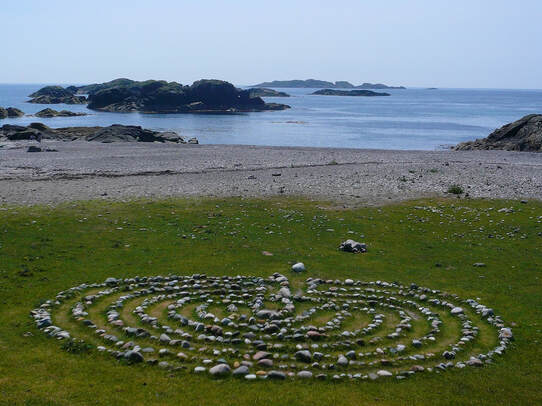

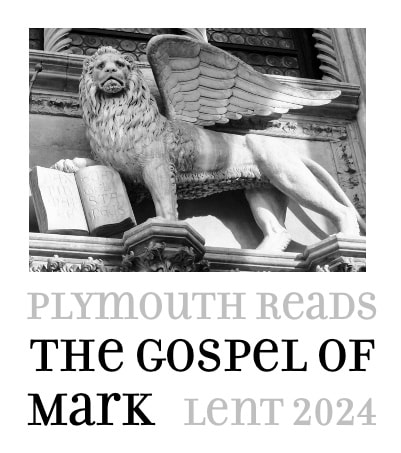




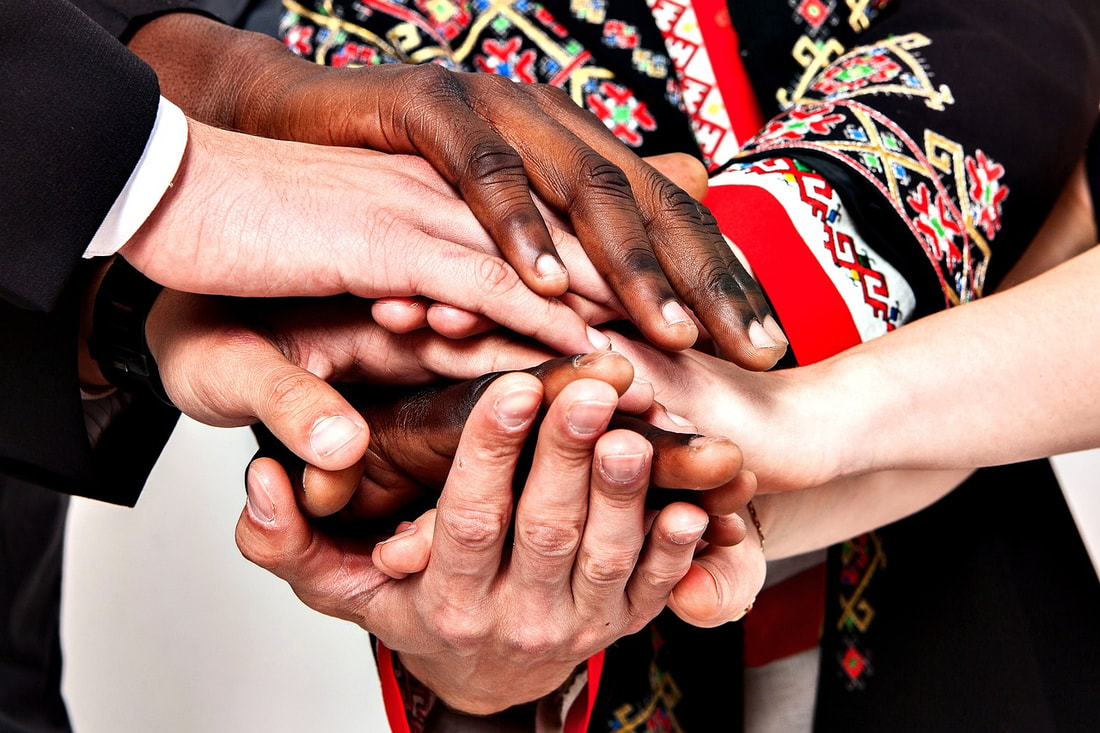



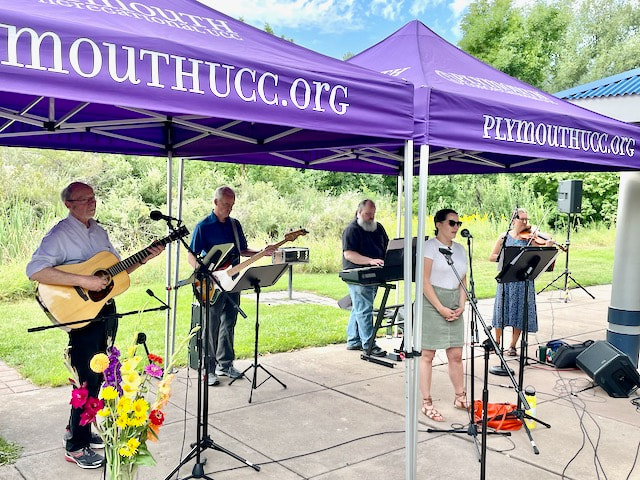
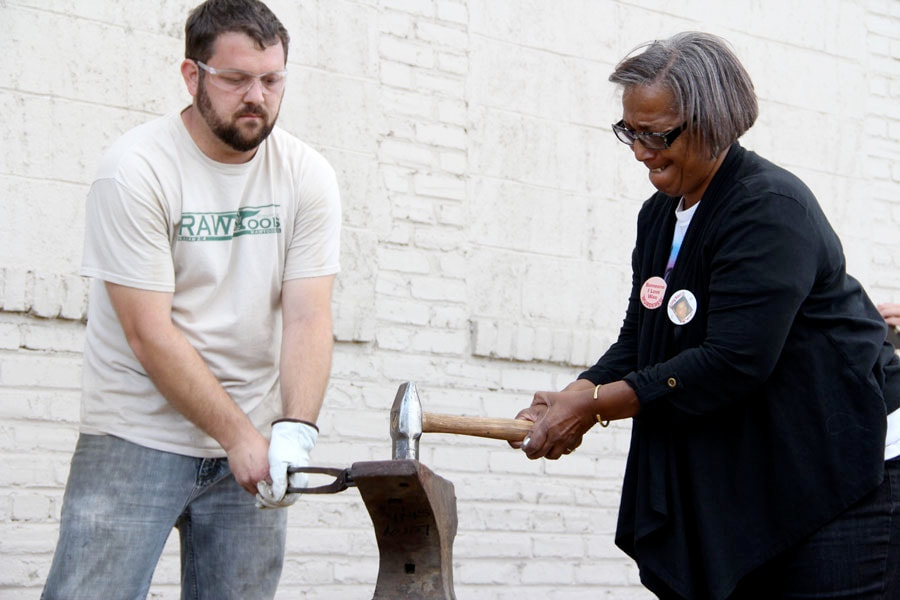
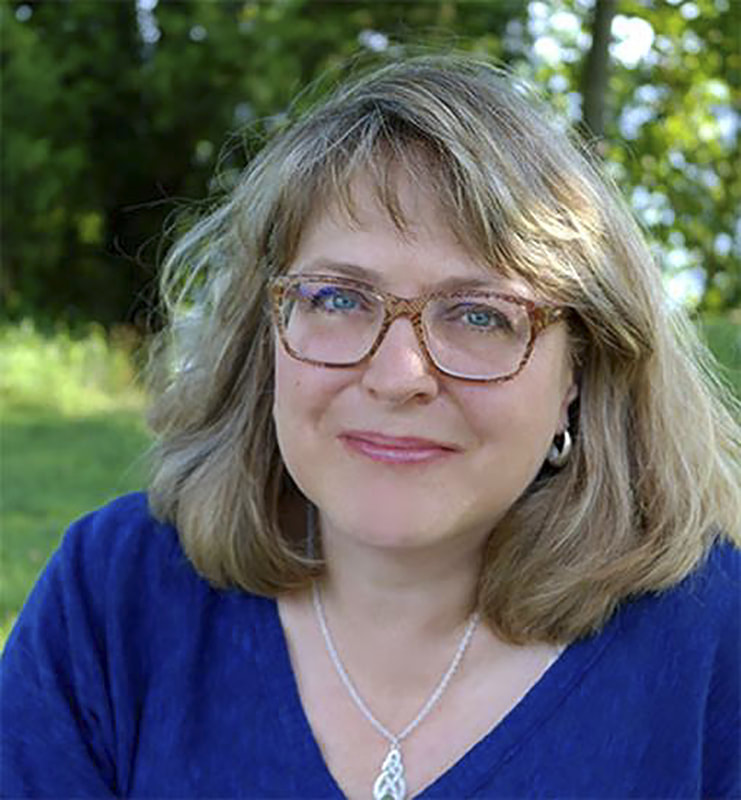

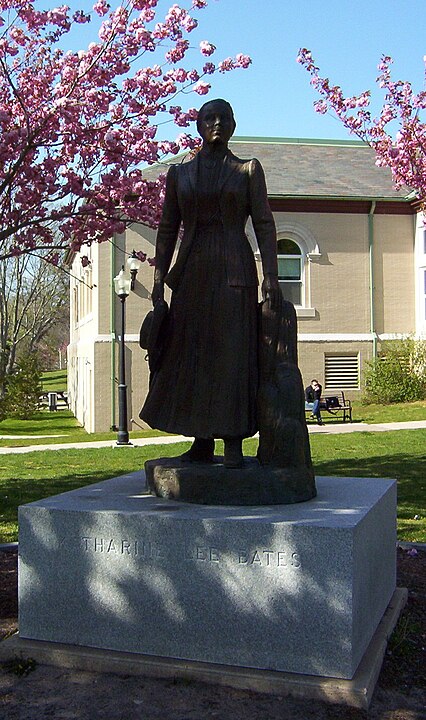

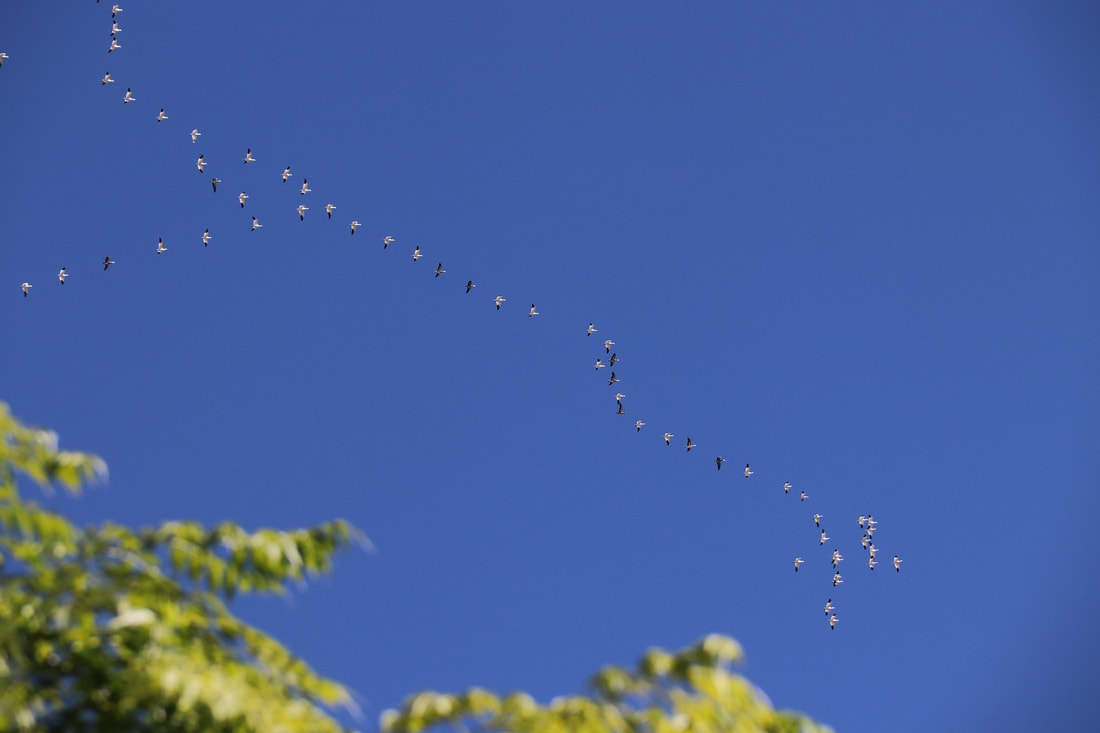

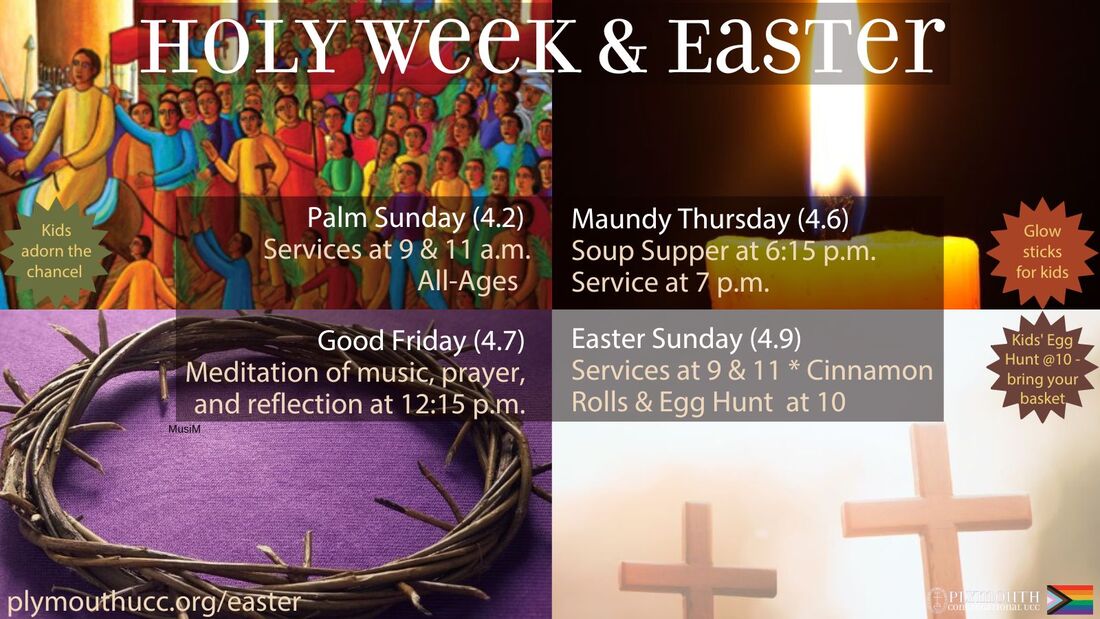





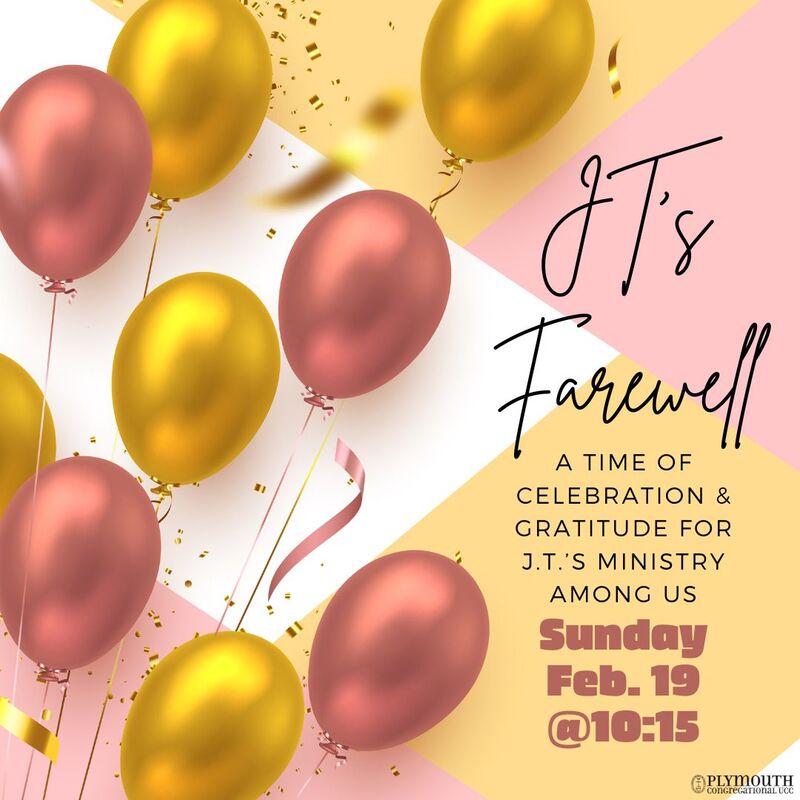
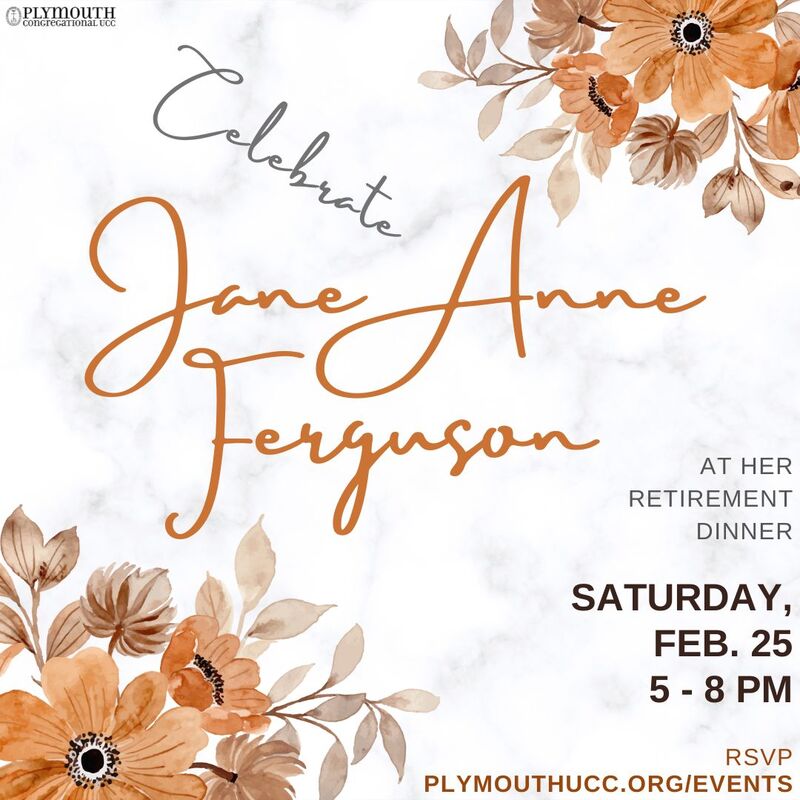


 RSS Feed
RSS Feed